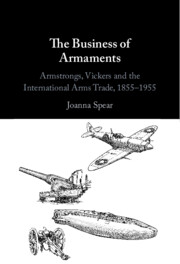Book contents
- The Business of Armaments
- The Business of Armaments
- Copyright page
- Dedication
- Contents
- Figures and Tables
- Acknowledgments
- Abbreviations
- Figures
- Introduction
- Part I Selling at Home
- Part II Selling Abroad
- 6 Foreign Policies for Selling Armaments to Latin America
- 7 Foreign Policies for Selling Armaments to Asia
- 8 Foreign Policies for Selling Arms to the Ottoman Empire/Turkey
- Conclusions
- Bibliography
- Index
8 - Foreign Policies for Selling Arms to the Ottoman Empire/Turkey
from Part II - Selling Abroad
Published online by Cambridge University Press: 19 January 2023
- The Business of Armaments
- The Business of Armaments
- Copyright page
- Dedication
- Contents
- Figures and Tables
- Acknowledgments
- Abbreviations
- Figures
- Introduction
- Part I Selling at Home
- Part II Selling Abroad
- 6 Foreign Policies for Selling Armaments to Latin America
- 7 Foreign Policies for Selling Armaments to Asia
- 8 Foreign Policies for Selling Arms to the Ottoman Empire/Turkey
- Conclusions
- Bibliography
- Index
Summary
Over the century considered here there were two overriding problems for Armstrongs and Vickers in doing business with the Ottoman Empire. First, the Empire’s constant indebtedness; they always needed loans to buy weaponry and had a habit of falling behind in payments. Second, the British Government followed its own diktats and would annoy the Ottoman rulers. Therefore Armstrongs– and later Vickers– despite pursuing independent policies, were often disadvantaged by being seen as British firms, showing the limitations of the firms’ independent diplomacy and marketing. Armstrongs through its alliance with Ansaldo– accidentally– discovered a route around the problem of guilt by association, and for a short time profited handsomely from that strategy. Having battled with Germany to secure plum contracts, on the eve of the Great War the British Government thwarted Turkey by commandeering the Sultan Osman I and the Reshadieh dreadnoughts built by Armstrongs and Vickers. This affected relations with Turkey until she joined the Allies in World War Two, after which she got British Export Credits. Postwar Turkey was granted American military aid, closing the market to Vickers-Armstrongs.
- Type
- Chapter
- Information
- The Business of ArmamentsArmstrongs, Vickers and the International Arms Trade, 1855–1955, pp. 288 - 335Publisher: Cambridge University PressPrint publication year: 2023

